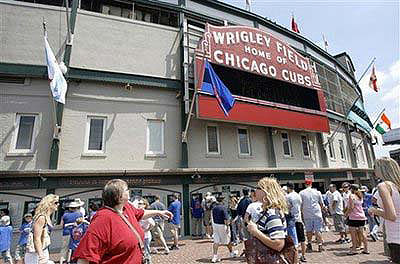|
|

In this July 25, 2008 file photo, Chicago Cubs fans gather outside Wrigley Field, Chicago. Media conglomerate Tribune Co. filed for bankruptcy protection Monday, December 8, 2008, as the owner of the Chicago Tribune, the Los Angeles Times, the Chicago Cubs and other properties tries to deal with $13 billion in debt. [Agencies] |
Media conglomerate Tribune Co., smothered by $13 billion in debt and a drop-off in advertising, on Monday became the first major US newspaper publisher to seek bankruptcy protection since the Internet sent the industry into a tailspin.
Most of the company's debt comes from the complex transaction in which the company was taken private, with employee ownership, by real estate mogul Sam Zell last year. Although Tribune's next major debt payment isn't due until June, the company has been in danger of missing financial targets set by its lenders.
Other newspaper companies have also struggled with their debts, but many have negotiated with lenders to ease their targets in exchange for higher interest rates.
"Tribune's debt was so outsized and so disproportional to its cash flow compared to these other companies that it can be the sore thumb sticking out rather than an example of the industry," said Ken Doctor, media analyst with Outsell Inc.
The Tribune owns the Chicago Cubs baseball franchise, as well as the Los Angeles Times, Chicago Tribune, The Sun of Baltimore, The Hartford (Conn.) Courant, six other daily newspapers and 23 television stations.
The company's lending agreements require it to keep its debt at a certain point relative to its cash flow. Those deals become harder to meet as revenue declines, even if the debt itself doesn't increase.
And while Tribune had planned on meeting its obligations with lenders by reaping income from its various properties, the recession has led consumers and advertisers to severely cut spending this year, exacerbating pressures the industry already was facing because of the migration of readers to the Internet.
To make a debt payment this year, Tribune sold the Long Island daily Newsday to Cablevision Systems Corp. for $650 million.
To generate additional cash, and meet the next debt payment of $593 million, due in June, Chicago-based Tribune has been looking to sell the Cubs, Chicago's storied Wrigley Field and the company's 25 percent stake in a regional sports cable channel. But a tight credit market has made it tougher for potential buyers to obtain loans.
"So, how did we get here? It has been, to say the least, the perfect storm," Zell wrote in a memo to employees. "A precipitous decline in revenue and a tough economy have coupled with a credit crisis, making it extremely difficult to support our debt. All of our major advertising categories have been dramatically impacted."
Monday's filing, made in bankruptcy court in Delaware, could give Tribune time to raise cash by waiting until the credit market eases to sell off assets. It also could put additional pressure on its lenders to ease the financial targets that Tribune must meet.
The company entered court protection with $13 billion in debt and $7.6 billion in assets.
Brent Jones, a Sun reporter and a vice chair with the Baltimore-Washington Newspaper Guild, said the bankruptcy filing unnerved the newsroom and prompted questions about whether Tribune might cut more jobs or sell the paper.
Zell said the company's operations will function as before during the bankruptcy protection period. He also said in his memo that the Cubs franchise is not part of the bankruptcy filing. The Cubs issued a separate statement saying that the timetable for a sale has not changed.
John Penn, a partner who specializes in bankruptcy at Haynes & Boone LLP, said the Tribune's decisions about whether to sell papers or other assets would boil down to one issue: "If it makes cash, keep it. If it loses cash, get rid of it," he said. "And that's either by selling it, closing it or whatever it takes to stop the bleeding."
Stephen Lubben, a bankruptcy profession at Seton Hall Law School in Newark, N.J., said Tribune employees are particularly vulnerable because they also own all the company's stock. Shareholders are last to be paid in bankruptcy, and they often end up with nothing, with the shares getting wiped out. Employee-stock ownership programs are not likely to be treated any differently under the bankruptcy code, Lubben said.
For instance, UAL Corp.'s United Airlines adopted an employee-ownership structure in 1994, causing employees to suffer steep losses after the company declared bankruptcy in 2002.
"That's a huge hit," added David Skeel, a bankruptcy professor at the University of Pennsylvania law school. "That will no doubt be the subject of much discussion in this case."
(China Daily via Agencies December 9, 2008) | 